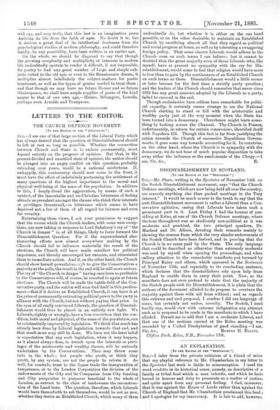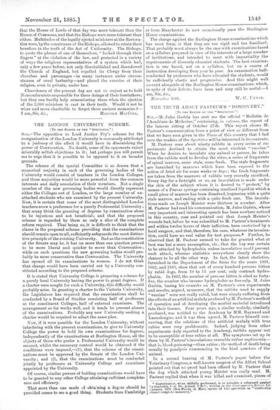AN EXPLANATION.
[To THE EDITOR OF THE "SPECTATOR."] SIB, I infer from the private criticism of a friend of mine that my playful reference to Mr. Chamberlain in my letter to the Spectator last week is liable to misconception. I used the word vendetta in its historical sense, namely, as descriptive of a family or tribal feud which a man inherits, and which he feels bound in honour and duty to prosecute as a matter of justice, and quite apart from any personal feeling. I find, moreover, that it was against the House of Lords rather than against the Church of England that Mr. Chamberlain proclaimed this feud ; and I apologise for my inaccuracy. It is fair to add, however,
that the House of Lords of that day was more tolerant than the House of. Commons, and that the Bishops were more tolerant than either. Multitudes of the legally ejected ministers at the Restora- tion were, by the connivance of the Bishops, allowed to retain their benefices in the teeth of the Act of Uniformity. The Bishops, to quote the phrase of one of themselves, " looked through their fingers " at the violation of the law, and protected in a variety of ways the religions representatives of a system which had, only a few years before, not only disestablished and disendowed the Church of England, but expelled its Clergy from their churches and parsonages —in many instances under circum- stances of cruel barbarity—and placed the exercise of their religion, even in private, under ban.
Churchmen of the present day are not so unjust as to hold Nonconformists responsible for these doings of their forefathers ; but they can hardly help remembering them when the ejection of the '2,000 ministers is cast in their teeth. 'Would it not be wiser and more charitable to forget these ancient memories P-



































 Previous page
Previous page